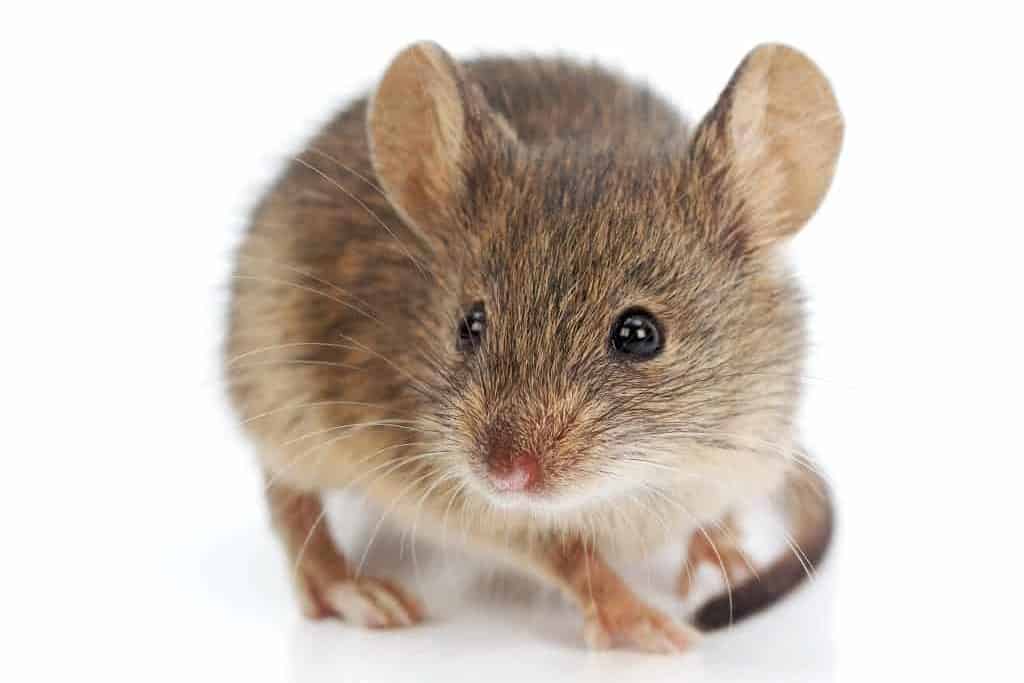Have you tried homemade mouse poison and remedies that simply don’t work? Have you been setting out mouse traps for several weeks, but not getting results?
While we prefer to start with mouse traps or using deterrents to get rid of mice, sometimes you just have to bring out the big guns to get the job done.
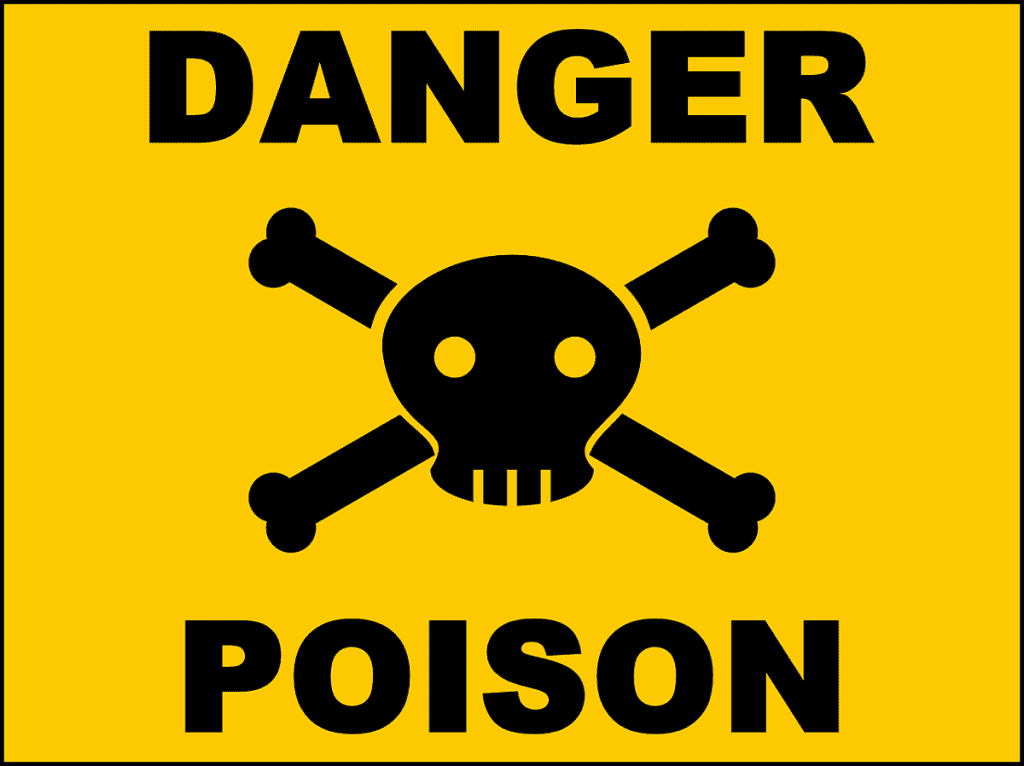
Mouse poison is quick and effective, but using poisons to kill mice requires a lot of care and attention. You want to know exactly what type of poison you’re using as well as how it works for best results.
Once you’ve purchased a poison or mouse bait, you’ll need to know about safe storage, best practices for using the poison, and how to clean up after a dead mouse.
If you have pets, you’ll also need to know what to do if your pet accidentally ingests the poison or happens to eat the dead mouse.
Table of Contents
Let’s see how you can safely use poison to kill mice by first looking at the three main poison types.
How Does Mouse Poison Work?
Do you have a mouse problem and want to know the best mouse poison to use? Unfortunately, the answer is not easy. There are several different types of poison on the market, and they all work a little differently.
It’s a good idea to become more familiar with the most common types of poison used to kill mice & how they work. This is helpful to determine the best mouse poison for your family AND what to do in case of accidental ingestion.
Anticoagulants
Anticoagulants are the most common poison on the market. What occurs is that these poisons block Vitamin K in the body. When this happens, the mouse cannot form blood clots and will eventually die.
However, what most people don’t know is there are several types of poisons used in this class and it may take up to two weeks to kill a mouse depending on the specific anticoagulant used.
Products that contain Warfarin and hydroxycoumarin require several feedings to kill a mouse. Bromadiolone and brodifacoum are also in the anticoagulant class but are stronger and faster acting. They are sometimes called super warfarin since they are 50-200 times more poisonous.
Doses of Vitamin K have been shown to be an antidote for anticoagulants. If a pet accidentally ingests the poison and treatment is sought immediately, they may survive with a Vitamin K treatment.
Metal Phosphides
Metal phosphides are fast-acting and will kill a mouse in 1 – 3 days. Usually containing zinc, these poisons enter the body and cause a toxic phosphine gas to form. Ultimately, these poisons are best when mice show immunity to regular anticoagulants.
There is a very low risk of secondary poisoning.
So, since the poison doesn’t reside in the animal’s tissues, it’s a little safer when eaten by an animal. But, there is still a slight danger.
Hypercalcemia
A very difficult poison to explain in words. Essentially, this type of poison uses high levels of vitamins to kill a rodent. What happens is that calcium absorption by food is greatly increased. As the rodent ingests more food, the calcium levels are raised so high that it starts to affect the organs.
Normally, death occurs within one week or less of ingestion.
How to Store Poison When Not in Use
Mouse poison is dangerous to both humans and animals. All poisons will have instructions on how to safely store and use them properly. But, it’s up to you to follow these directions to keep yourself, kids, pets, and other animals or humans safe.
Proper storage means:
- All poisons must be out of reach of children and pets. Ideally, all poisons will be locked away.
- Traps and bait must never be easily accessed by children or pets.
- Never store pesticides near food or water.
How to Safely Set out the Bait Stations
What does it mean to safely set out bait stations? This is done so that no one – besides that pesky mouse – can reach the bait stations. Ideally, you’ll place the bait station in an area that only the mouse, and you, can reach.
Some ideal places to place the mouse bait stations are in crawl spaces and attics. These are two areas that are favorite nesting and breeding grounds for mice that hopefully your pet or child will not have access to.
Obviously, this may not always be an option depending on your particular situation. In this case, you can choose areas that are very difficult to access where the mice frequent:
- Behind stoves.
- Behind refrigerators.
- Underneath the sink along the back wall.
You want to set bait stations where kids and pets can’t access them.
NEVER, EVER use the mouse bait by itself.
Always place the poison in a mouse bait station like the one shown to the right that was designed to keep the bait in and your pets out. Precautions should still be taken, but these devices help to prevent accidental ingestion.
One of the primary reasons pets or children are poisoned with mouse bait is when a proper bait station is not used. Most cost under $10 with bait included. This is a very small price to pay to keep your family safe.
There’s always a chance that mice may run off and be eaten by your cat or dog after ingesting the mouse poison. If this occurs, you need to take immediate action.
How to Minimize the Risk to Pets or Children
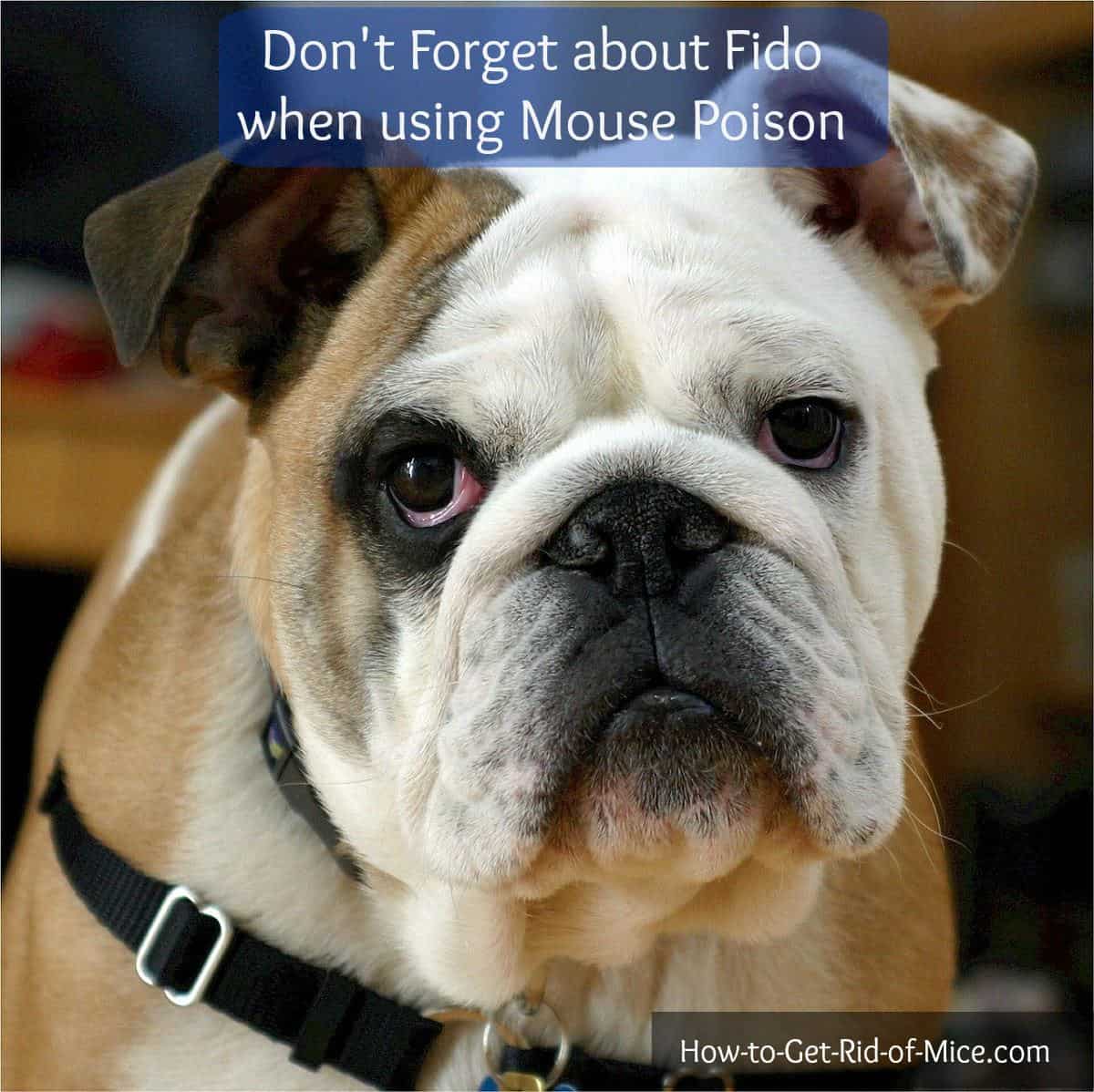
Is mouse poison safe for pets? No. If your pet eats the poison, you’ll need to take immediate action to ensure that the poison does not harm or kill them.
The first step is to minimize your risks:
- Keep pesticides out of reach of children and pets.
- Keep your animals out of the area where your bait station is placed or stored.
Just these two measures can greatly reduce the risk of pets or children coming in contact with the poison. However, if you have a cat, you know how it can take just one second for them to squeeze through a door undetected.
What If a Cat Eats the Dead Mouse?
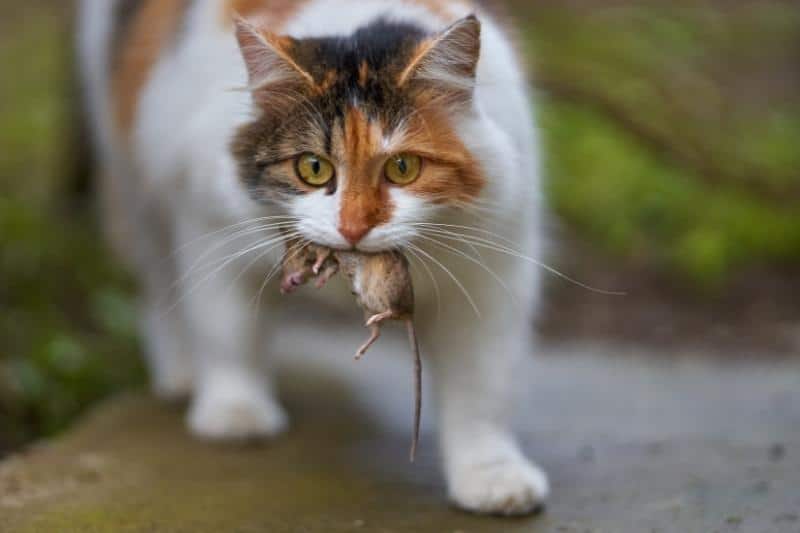
In the event that your cat eats a dead mouse, you’ll want to follow these instructions from the ASPCA:
- Contact your local ASPCA or veterinarian immediately.
- In the event that your animal is throwing up or seizing, take them to an emergency clinic immediately.
The short answer: seek medical attention for your animal immediately. If you only suspect your animal has ingested poison, or the mouse is now dead from poison, call your vet and keep all of the poison on hand to discuss your options.
The faster you act, the better the chance of your animal surviving. Smaller animals, such as a cat, will often exhibit symptoms from the mice poison before a large Doberman would. So even if you’re not positive that your animal has eaten the dead mouse, contact your vet.
Children will hopefully not eat the mouse. However, if your child has come in contact with the rodent, ensure that they wash off the exposed area immediately.
If by chance, your child did ingest some of the poison, a visit to the doctor or emergency room is recommended.
Additional Cautions: Indoor Use Only and The Safe Disposal of Dead Mice
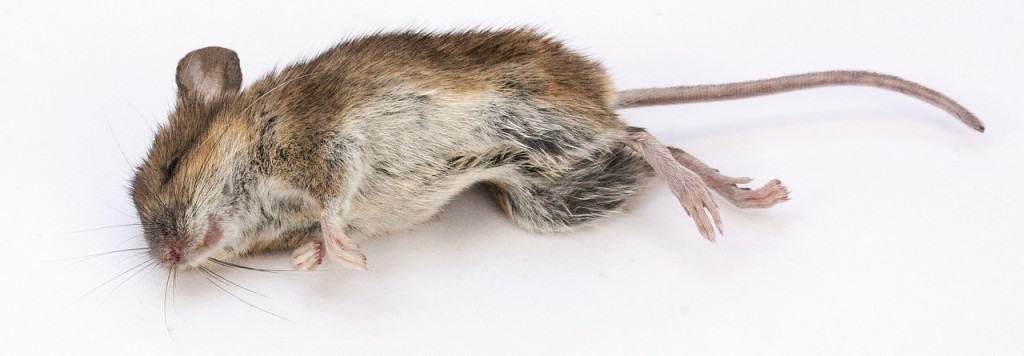
Some poisons are meant for outdoors, but even these products can be especially potent. Be sure to follow the instructions on the label and use only where directed.
When using mouse bait inside the home, it is essential to use only products meant for indoors. This will ensure that no other animals or children come in contact with the poison.
What happens when you have successfully killed your mouse? It’s time to dispose of the body. Follow these tips from the New York Health Department to safely get rid of the dead mice.
1. Wear rubber gloves.
NY Dept of Public Health
2. Make a disinfectant by mixing detergent plus 1 1/2 cups of bleach for each gallon of water.
3. Using a spray bottle of disinfectant, thoroughly spray dead rodents, traps, droppings and the areas where you found them.
4. Do not sweep or vacuum mouse droppings in your home until you have wet the affected area with detergent, bleach and water. Dry sweeping or vacuuming might put dust containing viruses into the air.
5. Place the sprayed rodent and/or droppings in a plastic bag and seal it. Then place the bag into a second bag, seal and dispose of with the trash.
The absolute best method is to call your local waste disposal company. They will be able to guide you in the right, legal direction of disposal especially if you had a large infestation on your hands.
You never want to simply throw the mouse in the backyard or even in the trash without securing it first, especially after it has been poisoned.
Summary & Other Alternatives
Poisons can be used to eradicate any mice problem you have. While poisons do need more care than a mouse trap, they are an easy way to kill mice and often require little cleanup if the mouse does not die in the house.
Storage, safety precautions, and using the right bait will ensure that you practice proper safety measures when using a potentially deadly substance.
If you’re not confident using poison, you still have plenty of other options:
- Using Mousetraps
- Strong Repellents
- UltraSonic Pest Chasers
- Peppermint oil and other home remedies.
Visit our home page at How-to-Get-Rid-of-Mice.com to explore other effective options to get rid of those mice!
